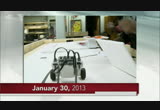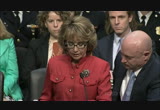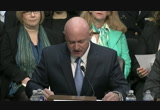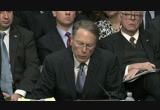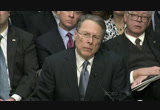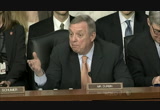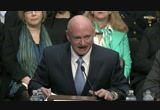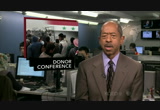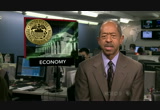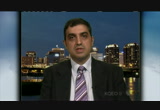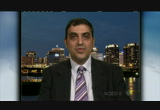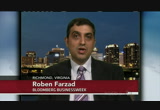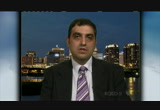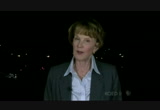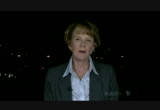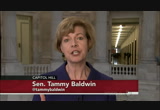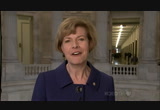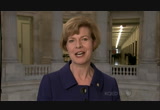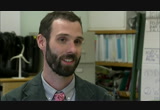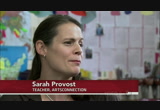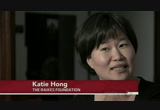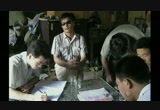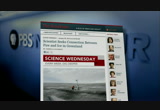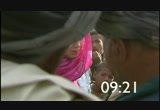tv PBS News Hour PBS January 30, 2013 3:00pm-4:00pm PST
3:00 pm
into real world applications in an effort to close the achievement gap between rich and poor students. >> i'm actually really excited to be creating this device. it really makes you feel, i don't know, grown up, i guess? it's not just learning, it's experiencing. >> ifill: and we close with a first person account of the struggle for human rights in china. ray suarez sits down with an activist who spent two years under house arrest. >> ifill: that's all ahead on tonight's "newshour." >> major funding for the pbs newshour has been provided by: >> and with the ongoing support of these institutions and foundations. and... >> this program was made
3:01 pm
possible by the corporation for public broadcasting. and by contributions to your pbs station from viewers like you. thank you. >> ifill: the challenge of gun violence, and the looming political fight over what to do about it, dominated a high- profile hearing today. the senate judiciary committee played host to leading voices from both sides of the debate. it was a day of drama in the packed hearing room. >> this is an important conversation. >> ifill: even before the senators had their say, former congresswoman gabrielle giffords stepped up to the microphone to make a brief and halting plea. >> speaking is difficult but i need to say something important. violence is a big problem.
3:02 pm
too many children are dying. too many children. we must do something. you must act. be bold, be courageous. americans are counting on you. >> ifill: giffords was shot in the head two years ago as she met with constituents in tucson, arizona. six others were killed that day. giffords and her husband, former astronaut mark kelly have now launched their own campaign for tougher gun laws. capitalizing on the public outcry that followed december's mass shooting at an elementary school in newtown, connecticut. >> after 20 kids and six of their teachers were gunned down in their classrooms at sandy hook, we said, this time must be different. something needs to be done. we are simply two reasonable
3:03 pm
americans who have said enough. >> ifill: but at today's hearings, national rifle association vice president wayne lapierre pushed back insisting that the real solution to gun violence is to enforce existing laws. >> unfortunately, we've seen a dramatic collapse in federal gun prosecutions in recent years. overall in 2011, federal weapons prosecutions per capita were down 35% from their peak in the previous administration. that means violent felons, gang members and the mentally ill who possess firearms are not being prosecuted. and that's unacceptable. proposing more gun control laws, while failing to enforce the thousands we already have is not a serious solution to reducing crime. >> ifill: several committee republicans endorsed that argument.
3:04 pm
>> i would call on president obama to call in attorney general eric holder and ask him why the prosecutions have dropped dramatically across all categories of federal gun laws. >> i have a hard time telling my constituents in texas that congress is looking at passing a whole raft of new laws when the laws that we currently are so woefully unenforced. >> ifill: committee chairman patrick leahy, a democrat, challenged lapierre on whether the n.r.a. supports limiting gun sales in any fashion. >> now, in your testimony in '99, you supported mandatory instant criminal background checks for every sale at every gun show. you said, quote, "no loopholes anywhere for anyone." now, today, of course, you said criminals would never submit to background checks. statistics show that many do. nearly two million convicted criminals and other dangerous people trying to buy a firearm since '94, as chief johnson said, were prevented. so let me ask you this: do you still, as you did in 1999, still
3:05 pm
support mandatory background checks at gun shows, yes or no? >> senator, i do not believe the way the law is working now, unfortunately, that it does any good to extend the law to private sales between hobbyists and collectors. >> okay, so you do not support mandatory background checks in all instances at gun shows. >> we do not because the fact is the law right now is a failure the way it's working. the fact is that you have 76,000-some people that have been denied under the present law. only 44 were prosecuted. you're letting them go. they're walking the streets. >> ifill: under continued questioning, lapierre argued that background checks are a burden only on the law-abiding. >> let's be honest, background checks will never be universal because criminals will never submit to them. >> ifill: illinois democrat richard durbin vigorously disagreed. >> mr. lapierre, that's the point. the criminals won't go to purchase the guns, because there will be a background check. we'll stop them from the original purchase. you missed that point completely. >> ifill: durbin pointed to chicago, where there have been
3:06 pm
42 homicides just this month, the most violent month since 2002. the latest victim: 15-year-old hadiya pendleton, who marched with her high school band at the president's inaugural parade just last week, was killed yesterday. >> i also want to say a word she attended the university prep school in chicago. she was an honors student and a majorette, and she marched in the inaugural parade last week here in chicago. it was the highlight of her young 15-year-old life. yesterday in a rainstorm after school, she raced to a shelter. a gunman came in and shot her dead. just a matter of days after the happiest day of her life, she's gone. we are awash in guns. the confiscation of guns per capita in chicago is six times the number of new york city. we have guns everywhere. and some believe the solution to this is more guns. i disagree. >> ifill: there was at least
3:07 pm
tentative agreement on the need for greater mental health care to head off would-be killers. mark kelly cited jared loughner, his wife's attacker, as an example. >> the killer in the tucson shooting suffered from severe mental illness. even after being deemed unqualified for service in the army and expulsion from pima community college he was never reported to mental health authorities. on november 30, 2010, he walked into a sporting goods store, passed a background check, and walked out with a semiautomatic handgun. he had never been legally adjudicated as mentally ill, and, even if he had, arizona at the time had over 121,000 records of disqualifying mental illness that it had not submitted into the system. >> ifill: in turn, the n.r.a.'s lapierre said it's the system that's broken. >> we need to look at the full
3:08 pm
range of mental health issues, from early detection and treatment, to civil commitment laws, to privacy laws that needlessly prevent mental health records from being included in the national instant criminal background check system. law-abiding gun owners will not accept blame for the acts of violent or deranged criminals. nor do we believe the government should dictate what we can lawfully own and use to protect our families. >> ifill: the president and some senate democrats are pushing for bans on assault-style weapons and curbs on high-capacity ammunition magazines. and as the politicians debated in washington today, three people were wounded at another shooting in arizona this one at a phoenix office complex. >> brown: we've collected all of our reporting on the gun debate. you'll find that on our website. and still to come on the "newshour": the mixed economic numbers; israeli airstrikes inside syria; real world lessons in the classroom and a chinese dissident who escaped house arrest. but first, the other news of the day.
3:09 pm
here's kwame holman. >> holman: john kerry gave his a rare storm blasted into the southeast killing two people. in georgia, an enormous funnel cloud struck cartersville and downtown adairsville 60 miles northwest of atlanta. it tore up homes, heavily damaged a large factory and flipped big trucks on their sides. another tornado did damage in mount juliet, tennessee. the storms rupted as a large warm air mass out of the gulf collidecollided with an incomind front. john kerry gave his farewell speech on the floor of the u.s. senate today. the veteran democrat is leaving, after 27 years, to become secretary of state. today, kerry looked back on his public career, starting with his service in vietnam and as a leading anti-war figure. in the senate, he focused on foreign policy, and was his party's nominee for president in 2004. >> eight years ago, i admit i had a slightly different plan to leave the senate.
3:10 pm
but 61 million americans voted they want me to stay with you. staying here, i learned about humility, and i learned sometimes the greatest lesson comes not from victory, but from dusting yourself off. >> holman: in boston today, the governor of massachusetts tapped william "mo" cowan-- a former aide to the governor-- as interim senator. cowan will become the second black member of this senate. cowan said he has no plans to run in the june special election to fill the remaining 18 months of kerry's term. donor countries pledged more than $1.5 billion today, in humanitarian aid for syria. about a billion of the total will go to help neighboring countries who are hosting refugees. the rest will go to aid syrians displaced inside their country. at the conference in kuwait, u.n. secretary-general ban ki-
3:11 pm
moon appealed to all sides, especially syrian president bashar assad. >> more than 60,000 people have been killed during last 22 months. personally i am pained to think how many more people may have to be killed in the coming days and weeks and months if we do not bring this situation to an end, urgently. >> holman: it's estimated two million people inside syria need food, shelter and other aid this winter. more than 700,000 others have fled to neighboring countries. >> holman: the federal reserve today said economic growth in the u.s. hit pause in recent months. in a statement, the central bank blamed bad weather and cuts in defense spending. it did not announce any new action to stimulate the economy. wall street reacted by giving up some of its recent gains. the dow jones industrial average lost 44 points to close at 13,910. the nasdaq fell 11 points to close at 3,142.
3:12 pm
those are some of the day's major stories. now, back to jeff. >> brown: whither the economy? that's been the question for quite a while now. today, there was a surprising and perhaps confusing new twist. the commerce department reported that gross domestic product actually shrank in the last quarter of 2012. the drop was small, one tenth of a percent. but it was still the first time economic output had fallen in three and a half years. government spending dropped, most dramatically in the defense sector. the report, though, also contained some positive developments: consumer spending and business investment were both up. and yesterday, the so-called case-shiller index found that housing prices grew in 20 major cities by an average of 5.5% over the previous year. it was the biggest gain in six years. we talk it through, with joel naroff, an economist, who heads his own consulting firm in pennsylvania. and roben farzad, a senior writer with bloomberg businessweek.
3:13 pm
joel naroff, let me start with you. this was a surprise to most people. what's behind the kr-pgs last quarter? >> well, it was largely the government's doing between the largest cutback of 40 years in defense which took well over a percentage point of growth out and the fears of falling off the fiscal cliff which caused businesses to be really, really cautious in their inventories and they failed dramatically, taking another percentage point or more out. those were the basic reasons. but, you know, as was noted, when you look at the fundamentals and details of what's going on in businesses and households and housing, those are all solid. i think that really says this economy has forward momentum despite what the numbers seem to indicate. >> brown: i want to come back to momentum. but the first two points you made, first about government cuts, we've heard a lot about that but companies restocking at a slower rate, what's behind that? what does that tell you? >> well, i think really what happened was that businesses were really cautious. uncertain about whether or not we'd wind up going off the
3:14 pm
fiscal cliff. and they made some very short-term decisions. it's easy just to keep the warehouses essentially empty if we don't go off the cliff they can refill them quickly so i think what happened during the end of the year was they just ran things very, very close to the vest and now i think we'll see in the first part of this year that they'll have to rebuild it and that will add to growth. >> brown: robin farzad, this was referred to as a pause in the economy. what do you see? >> the federal reserve has its foot on the gas, the pedal to the metal targeting unemployment with inflation so benign. after all, unemployment is still perilously close to 8%. it's been above 7.5% for the longest stretch in the post-world war ii period and the federal reserve realize there is' so much slack in the system it's going to keep going out there, rates at painfully low levels to support homeowners, people who want to take out mortgages, obviously
3:15 pm
corporations that can borrow at record low levels are loving this and and, oh, by the way, the stock market is at near record levels. i don't think many people on the street would appreciate that, but when and if they do remember their 401(k) log ins and go in there, they're bound to have a positive wealth effect. >> brown: tell us, robin, on that there have been report that small investors have been getting back into the market a little bit more confident, i guess. is that the case and what does that tell you? >> it's a paradox in that small investors i think for the past three years have cashed out of stock mutual funds to the tune of $300 billion. now, mind you, this was a three-year period that saw the stock market double. so it's more evidence of that rather tragic buy high sell low behavior that i think mom and pop investors have shown for many decades. and now they're realizing, many of them, that they're going to need the money for retirement, yields on savings, on bonds are so low that they have to go out
3:16 pm
there and get some more scratch, essentially into retirement. and it's not just retirement. it's their children, it's throwing everything into question, this great economic calamity. if you thought you were retiring at 65, maybe you have to push it back to 70. are you going to have enough disposable income? are you going to have to downsize out of your home? i think the federal reserve is still mindful of that and wants to be as accommodative as possible for as long as possible. >> brown: joel naroff, coming back to the signs you were seeing of potential growth, the market, other factors, address the consumer issue and the confidence issue. what signs do you see? >> well, there's actually two opposite things that's going on. they're saying that they're losing confidence. the recent confidence numbers were down fairly sharply. at the same time, almost all the data that's related to consumer spending-- whether it's retail sales, vehicle sales, housing market which is really an indication of consumer confidence are all going
3:17 pm
strongly. so i think if you look at what they're doing not what they're saying the consumers are still voting with their dollars that things are going to get better. now that taxes are increased, we've got to see how they're reacting to that, but up until this point, almost everything pointed to stronger consumer spending and that i take as a positive sign. >> brown: what about just filling in a little bit more on the housing sector because those numbers came out yesterday, they look good, they were interpreted as very positive. but i note that even robert shiller himself sort of suggested that he can't read all that much into them. how important is that sector? >> well, to me i think housing is critically important, not simply because of whole construction which obviously powers an awful lot of jobs but when you consider all the people who have been underwater for so long and they have this negative wealth effect, we talked about the fact that 401(k)s are going up. if they see house prices going up they feel an awful lot better
3:18 pm
as well. so i think this strength in the housing prices are really the most important factor out there and it's spread really across the country. not quite as strong as what's going on in some of the areas that collapsed like phoenix or las vegas but really any price increase that we're seeing, 3%, 4%, 5% in areas brings more and more people above water, they feel better, they can start making the moves they wanted to do and that helps the economy. >> brown: you know, robin farzad, we started this conversation with defense cuts hitting the g.d.p. in the last quarter. we now face the possibility, real possibility, of more defense cuts and very big domestic cuts. that's clearly a factor in anybody's thinking for forecasting the economy going forward, i assume. >> that's true and, jeff, frankly, i've stopped calling it the fiscal cliff. i got so tired. i'm calling it the budgetary butte, with your permission. it became so cliche into that final quarter of the year and you saw the market largely
3:19 pm
shrugged it off. >> brown: a butte is more picturesque than the cliff, but go ahead. yes. >> yes, indeed. so i feel that investors at least are not bothered about this. they see this as a game of chicken going up and down pennsylvania between the white house and congress. and much of this has been kicked down the road effectively for a couple of months. we do know that we have an unsustainable budget deficit situation but on the flip side you have economists like paul krugman out there saying do not worry about the budget deficit, this is not the time to be slashing public spending. as you saw, that actually helped push that economy into decline in the final quarter. that was a big variable in that. so this is a huge debate. but on balance what you're seeing is a lot of the unexpected has surprised the positive. you mentioned housing, housing is not just virtuous in that it helps homeowners and construction workers out there and material suppliers, it's also helping the banking sector
3:20 pm
which, after all, gorged itself on these terrible mortgages back if 2007 and 2008 and it thought it had to write those off forever. so manufacturing is surprising to the upside. suddenly detroit is resurgent, suddenly you're reading more about people who want to set up factories here in the united states because labor is becoming more expensive in the developing world. so this economy has really demonstrated an ability to surprise for the upside. now the big question is does this recourse back into employment? do you see hundreds of thousands of people who have to be hired every month to sustainably cut into this unemployment rate? >> brown: roben farzad and joel mar of, thank you very much. >> thank you. >> ifill: now to the middle east and new tensions along the border between israel and syria. the "newshour" has confirmed reports that israeli war planes struck a convoy inside syria today. syrian officials have confirmed
3:21 pm
some details of those reports and disputed others. israel would not confirm or deny the strike. margaret warner has been reporting on the developments from jerusalem. i spoke with her a short while ago. margaret, it's good to see you. based on your reporting, what can you tell us about this attack today? >> well, gwen, israeli officials are completely mum about this, but i've been able to confirm from a u.s. official that, in fact, the attack took place, that hit was a convoy of trucks carrying s.a.-17 antimissile components or the missiles themselves headed toward leban lebanon. the official i talked to said it actually occurred fairly near damascus but that the missiles or missile parts were already in hezbollah's hands. in other words, that this was not a syrian army convoy taking the weapons to hezbollah, the militant shiite group in lebanon, but hezbollah already had possession of them. if that turns out to be the
3:22 pm
case, it says a lot about hezbollah's actions and activities in syria right now. >> ifill: so a u.s. official has confirmed this to you. the syrian state television has said this happened. but israel's been awfully mum on this. what is -- why are they being so quiet about it? >> well, gwen, there's no percentage in it for israel to confirm this. first of all, the confirm that they violated syrian airspace. secondly they don't want to become the issue. in other words, they wanted to prevent these weapons from getting into hezbollah's hands in lebanon. but they certainly didn't want to do it in the a way or crow in a way that either syria feels it has to respond or hezbollah feels it has to respond. as one analyst said to me, if it was intended to send a message also to the two parties that, look, don't try transferring any chemical weapons or anything else because we have our eyes on you and we can take everything out, that message was received. syria and hezbollah know what
3:23 pm
happened. but, you know, from israel's perspective, they do not want to become, as i said, the issue. they are watching the demise of one of their -- of their nemesis in the region, one of them, syria, and they just prefer to stand back and let it happen. >> ifill: is there any risk for israel assad's fall should he fall? >> well, israeli officials think there is. and there's been an evolution of thinking on this. initially there was concern that, you know, assad's the devil we know, who knows what's going to happen? they certainly are concerned about jihadi elements in the rebel forces. they're concerned about the transfer of potential chemical weaponses to hezbollah but they've come around to the view that, in fact, it would be very good for syria because it will take the key link out of this arc that goes from iran through syria to hezbollah. and i went in actually to see the minister of intelligence and
3:24 pm
aatomic energy last week and he said to me if the assad regime falls it will be bad for the iranian regime. and he said "iran needs to lose this game in syria." so whether the israelis are correct or not, whether it will turn out that the devil they knew was better, they don't think so and they think that, in fact, iran will be less emboldened if they lose assad, their key arab ally in the region. >> ifill: is it fair to say, margaret, that whether we're talking about turkey's role or jordan's role, the u.s. role or israel's role, all of this circles back to iran? >> you know, it does, gwen, it really does. all these countries, one, are concerned about iranian influence in the region. two, are concerned about iran's nuclear weapons program and, three, some would say there's the sort of sunni/shiite divide which seems to become more and
3:25 pm
more a fault line in this arab and persian world. so it is very interesting that, for instance, as you know the israelis and the turks have not been getting along at all ever since the flotilla incident a couple of years ago and yet my understanding from both israeli and u.s. officials is that there's intense planning going on now among the u.s., israel the jordanians and the turks about a kind of division of labor. how to handle the chemical weapons, the potential dispersal of chemical weapons. who does the air power if some kind of special forces or ground forces are needed, who does that? so i think that on this issue, unlike, say, on the iran issue, israel and the u.s. are very much in tandem. at least they understand one another. and i'm told that netanyahu recently-- and i'm reading-- described his relationship with the obama white house on this as an "intimate relationship" which is certainly not the way one
3:26 pm
would describe their relationship over iran. >> ifill: so far tonight, nothing about retaliation from syria for this attack? >> no. though it is interesting, as you pointed out, that just really within the last half hour syrian television did confirm -- i think what they confirmed was that someone -- that planes did hit a facility near damascus. now, was that the facility where the s.a.-17s are coming from? we don't really know if the two are connected or it's all one incident and we have to remember, you know, after the benghazi attack how incomplete and scattered early reports are. but syrians have confirmed the israelis hit. >> ifill: fortunately we have you on the ground to keep up with the story. margaret warner, thanks so much. >> thanks, gwen. >> ifill: you can find a link to margaret's dispatches from israel and posts from the rest of our reporting team there on our homepage, including a story about an underground hospital built to withstand bombs and chemical attacks.
3:27 pm
>> brown: next, we turn to politics. judy woodruff has another in our conversations with newly elected members of the u.s. senate. >> woodruff: democrat tammy baldwin won a hotly contested race in the battleground state of wisconsin, defeating former republican governor tommy thompson with 51% of the vote. the 50-year-old baldwin previously served seven terms in the u.s. house of representatives, and before that was a member of the wisconsin state assembly. an attorney by trade, she replaces democrat herb kohl, who retired. baldwin is both the first openly gay person to serve in the senate and the first woman elected to the chamber from wisconsin. senator baldwin joins us now from capitol hill. congratulations, senator. first off, how are you finding the senate different from the house? >> well, thank you, judy. there's a lot to get adjusted to, even though the move has only been a few hundred yards.
3:28 pm
and i am really enjoying it. we're putting together an extraordinary team on behalf of the state, but one of the biggest differences is fighting for an entire state not just a small region within the state. and that is a tremendous honor. >> woodruff: senator, let me ask you first about government spending. you are on the budget committee and it appears at this point that republican congressional leaders are determined to let that so-called sequester across-the-board spending cuts, domestic and defense, go forward in the -- it would be taking place at the next few years but would go ahead and do that in the coming weeks. but on a day like today with downturn in the economy news for this quarter, the fact that defense cuts have already had an effect on the economy, where do you come down? do you think this is going to get resolved? >> well, i certainly hope that we do. and one of the things that's been encouraging is the head way made on averting the debt crisis
3:29 pm
from occurring as it did a couple of summers ago where our credit rating was downgraded and a crisis ensued. it was a manufactured crisis. so the fact that there's been some progress on that does mean to me that we can come together across the party aisle, avoid these political games and these manufactured crises and move forward. now, i can't predict exactly what's going to happen with the sequester but i think what's up to us-- and i'm thrilled to be a member of the senate budget committee-- is that we put a balanced plan together. that we recognize the importance of tackling the deficit and debt but that we also understand one of the key strategies to move out of it is growth, jobs, getting our economy back on track. and so i think we need to put a balanced plan forward. >> woodruff: immigration reform, senator. you have said that you believe that the bipartisan -- the plan that was put forward by a bipartisan group of senators,
3:30 pm
you called it a step forward in the right direction. but we know there's some key differences between that and what president obama wants. for example, the president is rejecting the idea of requiring improved border security, requiring a new tracking system to be in place before he lets people living in this country now illegally apply for citizenship. where do you come down on that? >> well, i have to take a moment and really applaud what we have seen in terms of an agreed upon statement of key principles for immigration reform that emerged from the senate on a bipartisan basis. we haven't seen this for quite some time. so i think it's worth taking a moment to recognize that and build upon that rather than immediately going to our differences. certainly this is going to be a complicated and time-consuming debate that i think will play out over the next several months but i think we're off to a good start.
3:31 pm
and the key principles on which there is agreement are very encouraging to me. in the senate it focuses a lot on border security, on a fair but tough path to it is schennship, path to documentation and i think those are all very important. these issues are important to all of our states also and certainly in wisconsin. we have a real stake in seeing this move forward in a positive way. >> woodruff: in general, do you think border security should come before those folks who are in the country illegally should be allowed to apply for citizenship? >> i think one of the reasons why we've been for comprehensive immigration reform for so many years is that it needs to come together. if you do it piecemeal, if you say this must come first before that you lose the coalition of bipartisan support necessary to actually get this across the finish line. we've seen that happen way too many times before so i do hope we can move all of this forward
3:32 pm
together. >> woodruff: one question about gun control. do you believe that an assault weapons ban can pass the senate today? >> you know, when i look at what vice president biden and president obama put together in terms of an array of opportunities for us to crack down on gun violence in these mass killings i start again with the things that i think we can win bipartisan support for, broad support from citizens across this country who are gun owners and not gun owners alike. and so i think there's a lot we can do to pursue this issue. the universal background check being one of the first that i would talk about. on the issue of a particular weapons ban, i do think that -- obviously it has been done before and i do think if we take the care to debate this properly and do it right perhaps something can move forward. obviously very tricky
3:33 pm
politically. >> woodruff: senator women in the senate. there are now 20, more than there have ever been before. do you think that fact will change the work that the senate can get done? the kind of legislation that's passed? >> you know, i do see women in politics having a different approach to issues and i think that that's going to work well. this record number of 20 is very exciting. we had our first dinner last night and i got a chance really to talk with my new colleagues about our approach, our process and how we go about tackling problems and solving problems. i think as we work together it's going to be a very exciting opportunity and i've always believed that when our legislative bodies look like a cross section of america we're better governed and we're getting there. we haven't gotten far enough, but we're getting there. >> woodruff: president obama in his inaugural address was the first president to advocate openly for gay rights.
3:34 pm
he said "our journey is not complete until our gay brothers and sisters are treated like anyone else under the law." how do you see that being translated into reality in the coming few years? >> you know, i was very struck with his references and it wasn't just that but his linkage of all of our struggles for full equality from seneca falls to selma to stonewall. wrapping one movement into the fabric of other movements for full equality was very important, very touching. i think that it was a very important inclusion, very important statement about what he wants to do as a leader moving forward but also a welcome call to all of us who serve in legislative branches and others that now is the time. now is the time to take additional steps. >> woodruff: well, senator tammy baldwin, thank you for joining us and, again, congratulations. >> thank you, judy.
3:35 pm
>> woodruff: in recent weeks we've also talked with republicans ted cruz of texas, jeff flake of arizona, and deb fisher of nebraska. and democrats heidi white camp of north dakota and tim kaine of virginia as well as independent angus king of maine. you can find those interviews on our web site. approach to teaching that's >> ifill: now, a different approach to teaching that's catching on in some schools. it's less focused on testing, per se and more on making sure that students are picking up skills they can apply in the real world. special correspondent john tulenko from our colleagues at the learning matters team has the story. >> reporter: for a dozen years education policymakers bet more testing and more accountability would mean more learning. but the gains have been modest at best and achievement gaps
3:36 pm
persist. and then there's everything that's not on the tests-- like creativity, responsibility and self-motivation. leaders in business and academia say not enough is being done to develop these vital traits. one possible solution? give students ways to apply their learning to bigger things than taking tests. >> we're building robots that are made to collect resources which are ping-pong balls. >> reporter: this was 13-year-old nathaniel's introduction to the idea that nations compete for scarce energy resources. >> you can do whatever you want to make them do this but they have to be able to go out, get ping-pong balls and bring them back. >> reporter: building robots kicked off a four-month study of energy by eighth grade students at king middle school in portland, maine. it's the theme of all their classes and it's led by science teacher peter hill. >> the school's approach is if everybody's engaged, everybody's
3:37 pm
learning as much as possible. so we plan exciting real world things that are tangible for the kids then do something really meaningful with it. so we need to revolutionize the way we use energy so we can improve people's lives. >> reporter: hill handed the students an ambitious assignment to finish by the end of the course: to build their own alternative energy devices. >> you're going to create a device that captures natural energy and transforms it into something that's useful for people in some part of the world. >> reporter: the idea that school work can and should have a real-world application is central to the philosophy at king. >> second to last one says a building that uses passive solar technology. >> reporter: and a hallmark of deeper learning. >> they see the meaningful and purposefulness behind what they're doing. that's what gets kids to sink their teeth into content. >> reporter: kids like leva pierce. >> i'm really excited to be creating this device. it really makes you feel, i
3:38 pm
don't know, grown-up, i guess, because you can actually grow up and do that. it's not just learning, it's experiencing. >experiencing. two! we got two! >> reporter: approach is similar at p.s.-130, a public elementary school in brooklyn, new york. >> puppet designers, who do we need to think about as we design our characters. >> the audience. >> reporter: visiting artist sara provost comes here twice a week to help fourth graders learn about native american culture by turning the myth they're reading in class into a puppet show. how is this better than just reading the story, sitting in group and talking it throw? >> so many ways. it's so -- i think it really makes the story come to life, obviously. they really internalize the story. they kind of get to live the story, you know? >> reporter: they're also learning other lessons.
3:39 pm
here's how. each student is making a puppet, but we were surprised so many puppets looked alike. turns out, they represent the same character but at different points in the story. >> let's make it that color. >> reporter: it's done this way to encourage collaboration, another hallmark of deeper learning. do you think the audience will know that this is the same character? >> yes. >> yes. >> they did an awesome job. we're asking them to think like artists. to really listen to one another's ideas, share their ideas. that's how they do it as their design team. >> reporter: social skills matter, but most public schools, under pressure to raise test scores, put a higher premium on academics and that doesn't sit well with deeper learning advocates like katie honk. >> i think just by focusing on just the academic content we left behind all of these other aspects of the whole child that are really also important to develop.
3:40 pm
>> let me see? >> reporter: deeper learning advocates believe it's not just what students know that will shape the course of their adult lives. what matters as much is who they are and how they see themselves and that starts at a fundamental level with how each child views their own capacity to learn. >> so, for example, having a growth mind-set versus a fixed mind-set. so the idea that intelligence is not something that you're born with but it's something that you can get good at if you put in effort. >> reporter: what can teachers do to develop the kinds of things that you're talking about? >> very simplistically, the way a teacher gives feedback on a test. >> reporter: huang sites a study in which teachers told a group of students they'd done well on a test because they were smart and another group because they'd tried hard. then they offered the students a chance to take the test again. >> the first group where they were told that they were smart actually don't really want to
3:41 pm
retake it because if you feel like every kind of test or exam is really the -- like a test on whether you're good or you're not it's not something that's motivating to you to want to continue to try harder at. whereas someone with a growth mind-set would take something and they say, huh, i didn't do as well but you know what? if i put in the effort i can get better at it. >> reporter: deeper learning advocates are interested in developing other traits like initiative, conscientiousness and perseverance all of which, they say, can be developed with the right teacher. >> you actually have to give rigorous instruction and set really clear goals so that the student has enough mastery experiences where if the student can actually see, wow, i set out to do this and i did do it. >> home work out, please. >> reporter: the goal in eleanor terry's a.p. statistics class at telecommunication arts and technology high school in new york city is for students to
3:42 pm
learn to be producers rather than consumers. >> so i want to hear words like "random number table." in most math class it is teacher gives information and it's kind of linear. you know, i do; you do; we do and then they're tested on it. students feel like this is happening to me. how many polling sectors are in there? yeah. in the statistics class they are going to create their own math. >> we will get a large variety. >> reporter: last fall ms. terry's students were debating the pros and cons of various polling techniques. but to go deeper she had students create exit polls of their own. >> i'm doing exit polls for an a.p. statistics class. >> reporter: on election day they gave them to voters across the city. >> if you want them to learn how to do statistics let them be statses teugss. we're going to end up with
3:43 pm
thousands of exit polls, large data sets that you have to clean up and it's going to be messy and no one will have done that before. so that data is theirs and whatever they discover is theirs. >> november 6 everybody has off because it's election day but we're going out and learning and a lot of us aren't disappointed we're going to be something school relled that day. we're happy because we're learning more. >> thank you so much. >> you're welcome. >> upon your mark, get set, go! >> reporter: back in portland, maine, where students will create their own alternative energy devices, phase one of the project ended with a robotics contest. >> one of the possible pitfalls that people from the outside might see in this learning is that it's all hands on. it's all fun. and trust falls and kumbaya around a campfire. what they need to know is that we really are fundamentally looking at what kids need to know. if it's meaningful and kids can
3:44 pm
apply it to situations that's something that's fundamental. >> reporter: in the weeks ahead, these eighth graders will examine wind energy and build model turbines in preparation for their final project: creating an energy generating device of their own. >> brown: finally tonight, a chinese activist who captured much of the world's attention while fleeing the country to the united states last year. >> suarez: it's been nine months since chen guangcheng put a very public face on the struggle for human rights in china. the blind lawyer had spent two years under house arrest for denouncing forced abortions and advocating basic rights. then, last april, he escaped from confinement in his rural village. and sought refuge at the u.s. embassy in beijing, where he stayed for six days.
3:45 pm
the incident put chen in the world spotlight and strained diplomatic relations between the u.s. and china. the 41-year-old dissident said chinese authorities even threatened his wife and family. but ultimately, the communist government gave him a visa to come to the u.s. and study at new york university. >> ( translated ): i am very grateful for the assistance of the american embassy and also for receiving a promise from the chinese government for protection of my rights as a citizen over the long term. >> suarez: yesterday, chen was honored with a human rights award in washington. i spoke with him earlier today. mr. cheng, the last time most americans heard about you you were on your way out of china after a tense couple of weeks. what's your life been like since then? >> (translated): it's hard to put it in one word. it's been eight months and i would say my life is much fuller
3:46 pm
now and the most importantly i'm free. i haven't been really rested for years and now i'm in a very good environment and there are a lot of things to be done and that i'd like to do so i have to be very engaged. it's a very, very full of things to do and i'm very happy about that. >> suarez: are you able to keep up with events in china as closely as you were when you were doing your human rights work there? >> (translated): there are many ways to get -- to become informed. in a sense, it's easier to be informed here than when i was in china. i'm not saying that in china things cannot be done. what i'm saying is that things can be done from many different angles to promote what we need to promote. >> suarez: well, since you left the country there have been
3:47 pm
continued arrests of dissidents, suppression of press freedoms with the southern weekly, attempts to control access to the internet. a lot of things are moving along in china. what does it tell you about the government's attitude toward free speech and free thought? >> (translated): i think this only goes to show that the chinese government and the party still wants to control everything and if they keep holding an attitude of controlling everything otherwise they couldn't sleep i'm afraid they won't be able to sleep well ever. the more they try to suppress the journalism and free media the more it goes to show how important it is and the important role that free peres
3:48 pm
places in promoting the progress of the society. >> suarez: there's been a new party congress, a new leadership team put in place. are there any signals about their coming attitude toward all these matters? personal freedom, human rights, free speech, free peres? >> (translated): yes, new leaders have come in but if the team is the same i would say not to express too much. but if a sitting team is willing to respect the trend of the time and to respect the people's will then he can make change. but at this point i would not put my bet on it. if we want to have hope in china and the hope is with the people. so i think it's the people who are going to change the future.
3:49 pm
>> suarez: how? how can the people change the future when their lives are so thoroughly controlled? >> (translated): again, where there is oppression there's resistance. and they invest tons and tons of money and human resources to control. on myself alone they have spent 0, 80 millions and thousands of people and what happened? i'm here. i'm sitting right here. dictators are actually very fearful themselves. even when they're asleep they're afraid that others will take their powers away and, in fact, their own powers are taken by force, by violence. they are not just afraid of me as an individual, they are afraid of a lot of people and
3:50 pm
the overall suppression on the average people having -- has deterred and so they are -- there's suppression on other minority groups. they spend -- like i said, they spend a lot of money on me and they spend a huge amount of money on so-called stability maintenance, just imagine where the -- where does that money go? >> suarez: are you optimistic that before you're a very old man you'll be able to go home to your village and live as a free person? >> (translated): the way you frame it is to pessimistic. i don't have to wait until my old years to go back. but i don't know which day or which year. all i know, i don't think it's going to take too long. >> suarez: from your answer it
3:51 pm
sounds like you're pretty optimistic about the future of china as a free country. >> (translated): the people are waking up. this is the utmost factor at play. it needs you and me and everybody else to pay attention to what's going on in china. help when ever wherever you can to shorten this process. >> suarez: mr. chen, thank you very much. >> (translated): thank you very much. thank you everyone in the whole world who cares about human rights and thank you, kind americans, and thank you everybody who has helped. >> brown: there's more online where you'll find links to our earlier stories about the chinese activist. those are on our world page. >> ifill: again, the major developments of the day: at a high-profile senate hearing, former congresswoman gabrielle giffords-- herself wounded by a gunman-- appealed for action on gun violence.
3:52 pm
another gunman opened fire in an office building in phoenix, arizona, killing one person and wounding two others. tornadoes blasted parts of the southeast. at least one town in georgia was heavily damaged, with two people killed. and israeli warplanes struck inside syria. but the syrians disputed reports that the target was a convoy, carrying anti-aircraft missiles to hezbollah fighters in lebanon. a question: is there a connection between widespread wildfires and glacial ice melt? kwame holman tells us more. >> holman: last year, greenland's ice melted at the fastest rate ever observed. and 2012 was the third worst year on record for wildfires in the southwestern united states. in our science wednesday report, meet a climatologist who says the two extreme phenomena could be related. plus, what's so funny about monetary policy? on making sense, find the final installment of our humor and economics series.
3:53 pm
all that and more is on our website newshour.pbs.org. gwen? >> ifill: and that's the "newshour" for tonight. on thursday, we'll talk with former vice president al gore about his new book "the future" and much more. i'm gwen ifill. >> brown: and i'm jeffrey brown. we'll see you online and again here tomorrow evening. thank you and good night. >> major funding for the pbs newshour has been provided by: ♪ ♪
3:54 pm
moving our economy for 160 years. bnsf, the engine that connects us. >> and with the ongoing support of these institutions and foundations. and... >> this program was made possible by the corporation for public broadcasting. and by contributions to your pbs station from viewers like you. thank you. captioning sponsored by macneil/lehrer productions captioned by media access group at wgbh access.wgbh.org
3:58 pm
funding for this presentation is made possible by the freeman foundation of new york, stowe, vermont, and honolulu, newman's own foundation, and union bank. >> at union bank, our relationship managers work hard to know your business, offering specialized solutions and capital to help you meet your growth objectives. we offer expertise and tailored solutions for small businesses and major corporations. what can we do for you? >> and now, "bbc world news america." >> this is "bbc world news america."
3:59 pm
meet the bomb makers. we go inside of the fight against bashar al-assad just as israeli warplanes carried out a strike in syrian territory. america's gun debate moves to capitol hill where a congresswoman who was shot herself makes it difficult personal plea. >> it will be hard but the time it is now. you must act. >> we used to love our blackberries, now the company is moving into smart phones. we love them, too? welcome to our viewers on public television in america and around the globe. the war in syria is more
177 Views
IN COLLECTIONS
KQED (PBS) Television Archive
Television Archive  Television Archive News Search Service
Television Archive News Search Service 
Uploaded by TV Archive on

 Live Music Archive
Live Music Archive Librivox Free Audio
Librivox Free Audio Metropolitan Museum
Metropolitan Museum Cleveland Museum of Art
Cleveland Museum of Art Internet Arcade
Internet Arcade Console Living Room
Console Living Room Books to Borrow
Books to Borrow Open Library
Open Library TV News
TV News Understanding 9/11
Understanding 9/11